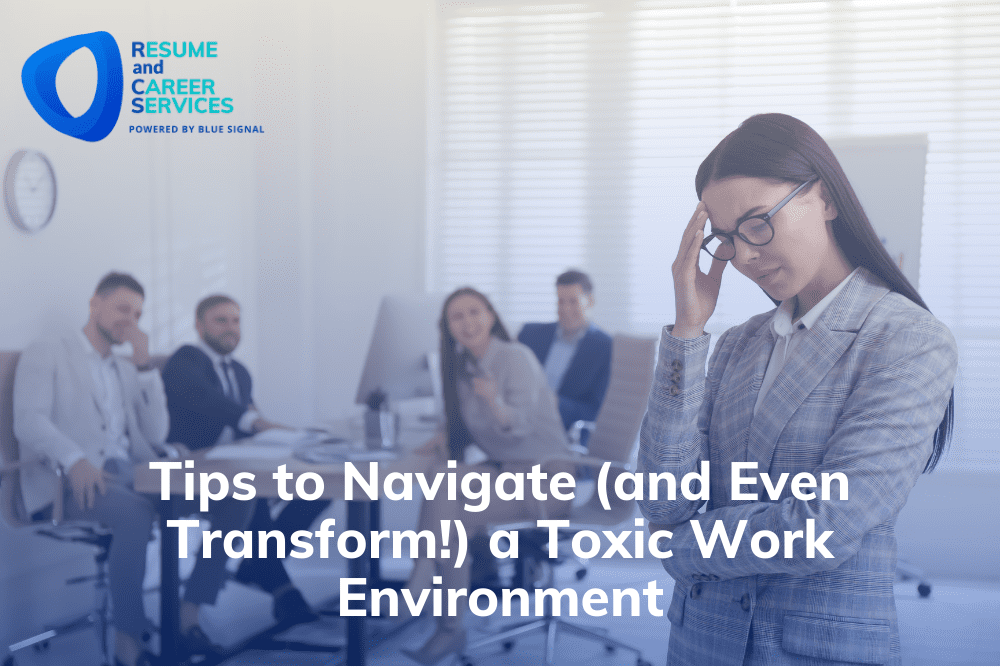Tips to Navigate (and Even Transform!) a Toxic Work Environment

Do you dread going to work? Sometimes, that anxiety about work—whether you’re in an office setting, remote, or hybrid—can be less about the actual work itself and more about the culture and people. And when it gets really bad, you could be working in a toxic work environment.
A toxic work environment is one in which negativity is so intrinsic in the culture that a lack of productivity and support is the norm. While there certainly are toxic cultures, it’s more often that you’ll find a toxic coworker, manager, or department. When the entire organization is negative, it’s much harder to navigate that situation and nearly impossible to transform it. But when you’re dealing with a person or department, there are some things you can do, and at least consider, before you start updating your resume and beelining for the door.
Prioritize Your Self-Care
Your wellbeing at work (and life in general) is paramount. Be sure that you are doing things when you’re not at work that will help you recharge and relax. That can look like a host of options, from meditating and exercising to journaling or enjoying quality time with family and friends. Having something to look forward to at the end of the day or on the weekend can help you be more productive at work, somewhat insulating you from the toxicity.
Manage Your Emotions
A toxic work environment can make you a little unbalanced and cause your emotions to go on a rollercoaster ride. To counteract that up and down, practice emotional intelligence, which is the ability to manage your own emotions while showing empathy to how others feel. When faced with a toxic environment, one of the best things you can do to center yourself is to remain emotionally calm and respond thoughtfully to the challenging situations you face. Since we tend to mirror others, your calm demeanor may lead to a more respectful atmosphere and deescalate the situation.
Maintain Your Boundaries
 It’s vital to establish clear boundaries between work and home. 20-Something Finance reports that the US is the most overworked developed nation in the world. That’s not only because we tend to stay at work longer; it’s because we are always working. Nights, weekends, even on holidays and vacations, we Americans are tethered to the office through our smartphones and laptops. When you don’t make clear distinctions between working hours and leisure hours—especially when dealing with a toxic work environment—it can lead to a spilling over of the yuck into your personal life. Remember to leave work at the office, even if that office is in your home.
It’s vital to establish clear boundaries between work and home. 20-Something Finance reports that the US is the most overworked developed nation in the world. That’s not only because we tend to stay at work longer; it’s because we are always working. Nights, weekends, even on holidays and vacations, we Americans are tethered to the office through our smartphones and laptops. When you don’t make clear distinctions between working hours and leisure hours—especially when dealing with a toxic work environment—it can lead to a spilling over of the yuck into your personal life. Remember to leave work at the office, even if that office is in your home.
Set and Focus on Work Goals
Setting goals is an excellent way to stay focused and avoid distractions. Be your own project manager with the tasks on your work to-do list and get them done. Completing tasks and reaching goals will help you create a sense of accomplishment, which can effectively counterbalance the negativity of a toxic work environment. You can even enroll coworkers in your efforts to generate a more positive, team-centric approach.
Cultivate Positive Relationships
When your entire department or corporate culture is toxic, this can sound like a daunting task. But the truth for many is that it’s just one or two people who are the bad apples and threaten to spoil the entire bunch. You can create your own positive subculture by partnering with colleagues who share your values and approach to bettering the work environment. Building a supportive network of likeminded individuals at the office can create a safe space where you can share experiences and seek advice.
Be Specific and Direct
Passive-aggressive—or just downright aggressive—coworkers are a challenge. Don’t feed into their games. Instead, address issues directly, specifically, and professionally. Your ability to use and promote clear, open communication will help avoid misunderstandings and potentially create a more harmonious relationship with your coworkers.
Seek Internal Support
A mentor or advocate, whether in your department or another area of the company, can provide advice and guidance when it comes to navigating a toxic work environment. Some organizations even offer counseling services or employee assistance programs. These resources can provide emotional support, coping strategies, and a sounding board as you manage the situation. If you’re not sure where to start to identify these resources, reach out to your human resources department. Some even have a way to contact them anonymously.
Focus on What You Can Control
While there will always be components of life and work outside of your control, especially in a toxic setting, there are still some things that you can master. You can control your attitude and reactions. You also have the ability to manage your values and stay true to them. By focusing on those aspects of the situation that you have a handle on, they will become more manageable, and your efforts could even improve the situation overall.
Keep Records for Yourself
In a truly toxic environment, one that cannot be easily maneuvered, you must document incidents and interactions that are causing distress. With as little emotion as possible, note the date and time of each incident, the involved parties, and what occurred. Keep a running record of these situations in a secure location. This will be a helpful tool to use if you need to report to management, HR, or an attorney as the situation progresses.
Be a Change Agent
To truly transform a toxic work environment, you’ll need to take action. That means being a catalyst for change and being proactive in making a difference. Talk to coworkers who share your viewpoints to engage them in supporting a more inclusive and respectful culture. You may be surprised at how just one voice can inspire a chorus of positive change.
When It’s Time to Exit a Toxic Work Environment
Even with your best efforts and a positive mindset, turning around a toxic culture is not always possible. If your attempts to change the situation are ineffective, it might be time to explore other job opportunities. You need to do what’s right for you, including nurturing your wellbeing and career growth.
As you begin to look for a new position, be prepared to answer the question many potential employers will ask: “Why do you want to make this move?” Remember to avoid discussions about the toxicity you’re attempting to escape. Focus, instead, on your desire to advance your career or gain a better work-life balance. Negativity can be pervasive, and your new employer won’t want to make an offer to someone whom they may perceive as a magnet for drama. No matter how much you tried to change things, it’s sometimes best to walk away and start again.
If you’re ready for a change, Resume and Career Services provides you with the tools you need to make that transition easier. From resume writing to full career support, we help you make the move that’s best for you. Learn more about how we can help.
